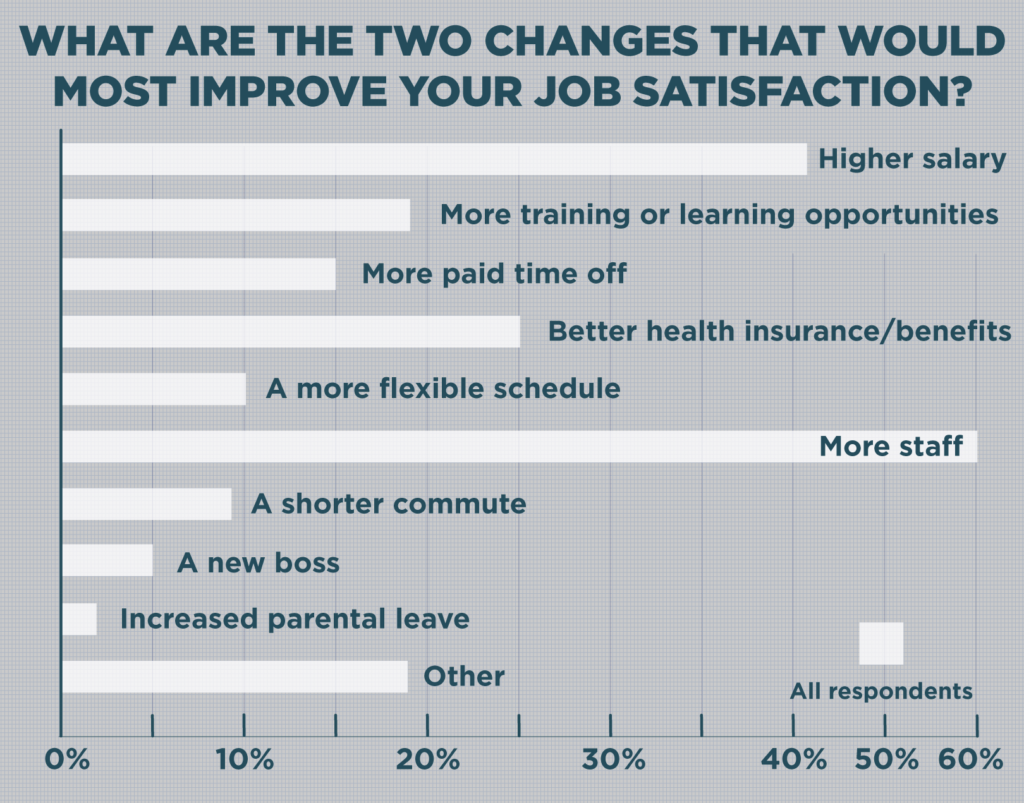
The depth of the staffing crisis in nursing homes around the U.S. can be summarized in one observation: Far more industry leaders now say adding staff would improve their personal job satisfaction more than receiving a higher salary.
It is the first time something other than “higher salary” has been the top response to the question, “What are the two changes that would most improve your job satisfaction?” in the annual McKnight’s Mood of the Market Survey.
The option “more staff” (58%) overtook “higher salary” (42%), although survey respondents this year were asked to pick two factors, versus one the year before, accounting for a rise in percentages.

Nonetheless, the “more staff” selection leaped by two-and-a-half times, up from 23% in a year’s time.
“There’s no question [top managers] have to realize the value of their staff,” observed Paul Gavejian, managing director of Total Compensation Solutions.
The next most popular choices, in order, were: “better health insurance/benefits” (23%), “more training or learning opportunities” (18%), “other” (17%), “more paid time off” (15%) and “more flexible schedule” (11%).
The third annual McKnight’s Mood of the Market Survey gathered the attitudes of 627 long-term care administrators and nurse managers, a 65% rise in participants over last year. They answered 15-question surveys between July 28 and Aug. 3, 2021. A random drawing for five $100 gift cards was offered as incentive to participate.
Though both ranked it the No. 1 factor toward improving their personal workplace satisfaction, administrators were slightly more likely to list “more staff” as a top-two need, compared to nurse managers (60% to 57%). Similarly, administrators chose “higher salary” a little more often than their nurse manager counterparts (43% to 41%)
The biggest gap between the professions came in the third priority for both: “Better health insurance/benefits” was chosen by 28% of the 307 nurse respondents, while 20.5% of the 320 administrators tabbed it. The nurses also were more likely to mark “more training or learning opportunities” as a top need (19% to 16%).
The next-to-last priority for both respondent groups was getting “a new boss.” Nearly 6% of nurse managers made it a top-two priority, while 5% of administrators did the same. Yet the picture was far from rosey when ranking superiors, survey findings revealed.
Bosses expected to do better
Positive responses fell by 10% when respondents were asked how much they trust their direct supervisor to “provide you with opportunities to advance your career.”
The “a lot” answer option fell to 32% in 2021 from 42% in 2020, while “some” stayed about the same (26%).
Respondents retained just about the same views as a year earlier when asked to rate the opportunities their companies provide for career advancement. Once again, nearly 60% responded either “excellent” (22%) or “good” (36.5%). Response rates for “fair” (25%) and “poor” (17%) did not budge substantially.
It is understandable that direct supervisors might be viewed a little less charitably, given the public health emergency conditions of the last year and a half, said benefits and compensation expert Mark Heston of Heston & Associates.
“Dealing with the immediate crisis has made some of the other important things, such as career guidance, seem not as important,” Heston noted. “Your line of sight becomes, ‘Let’s get through today’ not, ‘Where do you want to be in five years?’ We’re not having those discussions, and we need to more and more.
“People like to work for and keep working for, someone who cares for them and cares about them,” he continued. “How do you show that? Whether you’re offering career advice or asking, ‘How can I make your job easier?’ whatever it is … You have to make sure you’re asking those questions and making sure you’re having that meaningful dialogue.”
Even though “higher salary” was replaced as the top desire for respondents, it still looms large. Some good news might be on the horizon overall.
“The most positive thing people are seeing is salary increases,” said Matt Leach, principal and senior consultant for Total Compensation Solutions. “That’s across the board, but probably weighted a little more toward the lower-paid jobs. But the market is moving quickly for these folks. Facilities are getting on board [with wage increases] but having problems with not just attracting talent but keeping current talent because of the movement in the market.”
Many operators have responded to the push for a $15 per hour minimum wage for nursing home workers, either by their own will or due to competitive pressures, he noted. That can be both good and bad, Leach, noted.
“I’m really curious as to how this goes in about a year from now with how some of these companies will be able to afford what the pay rates are. There’s some hope that, come September (2021), that the market will be a little less aggressive because some (unemployment) aid will expire, and they’ll be able to add workforce. But there’s just not enough healthcare workers in the country.”
Analysts across the U.S. have noted that some nursing homes have been forced to turn away admissions, or close for good, due to workforce shortages.
Continuing care retirement communities appear to have an edge over nursing homes in the staff funding and recruitment battles, Leach noted. That’s because they are better able to raise their patient pricing to fund better worker pay.
Mood of the Market findings released earlier this week showed that nurse managers are wearing down after nearly a year and a half of frontline pandemic conditions and are considering leaving their jobs or the profession altogether at a much higher rate than administrators or managers in other industries.
Tomorrow: Top managers predict when census levels will return, plus evolving attitudes about staff vaccine mandates.




